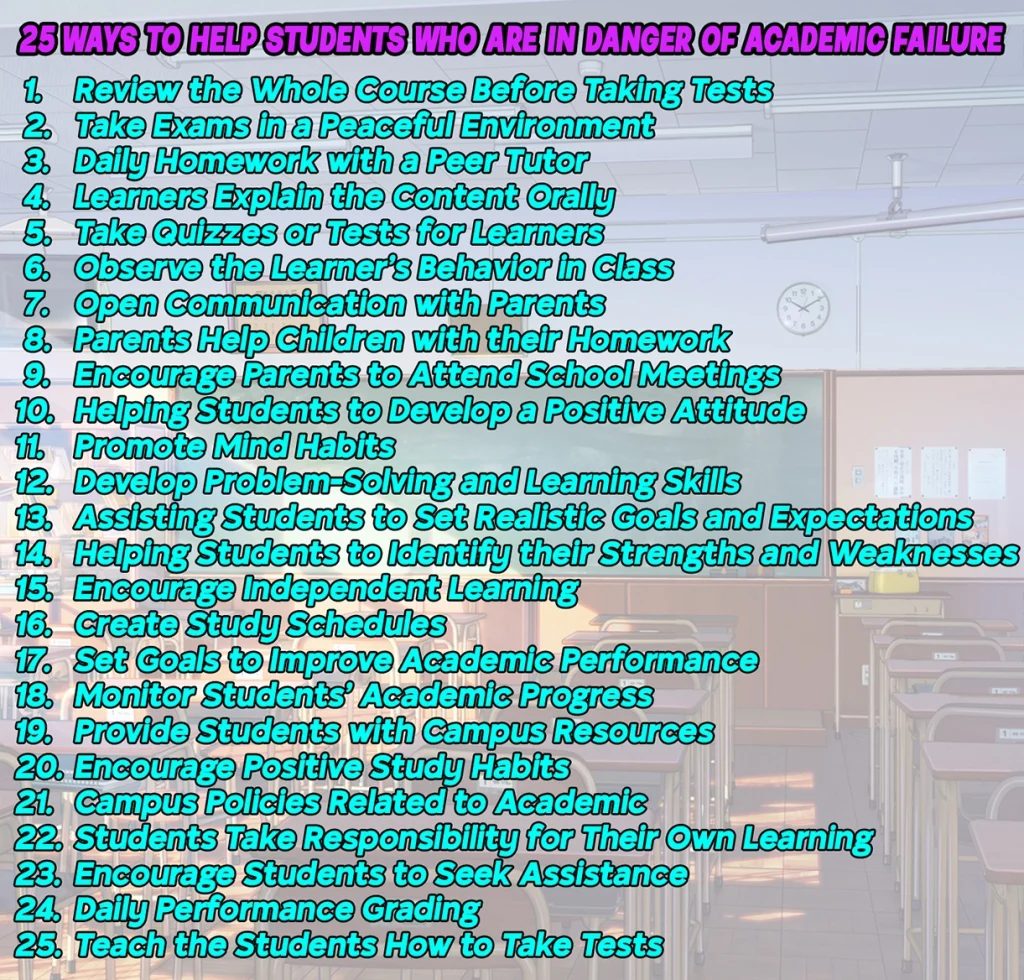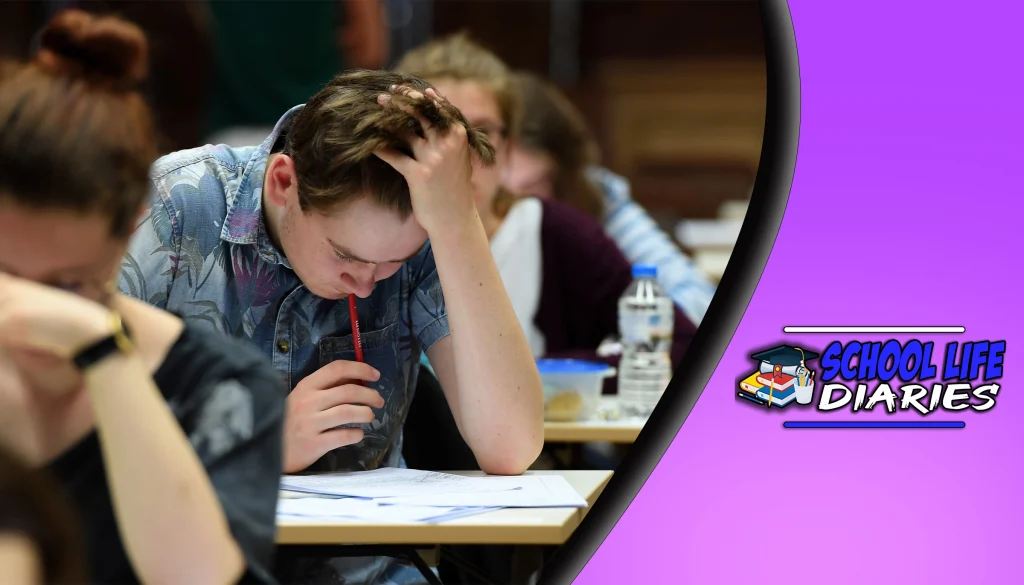If you are a student who is in danger of academic failure, there are ways that you can get help and improve your chances of success. Here are 25 tips to help you out.
- Review the Whole Course Before Taking Tests
You can review the whole course before taking the tests. This is a great way to review the material and make sure that you understand it. If you have any questions, you can ask the instructor or review the material again. Reviewing the whole course will help you prepare for the tests and get a better grade.
- Take Exams in a Peaceful Environment
To help students who are in danger of academic failure, it is important to minimize distractions in order to focus on the task at hand. One way to do this is by taking tests or exams in a quiet space. This will help students stay focused and avoid getting off track.
- Daily Homework with a Peer Tutor
Some students find themselves struggling to keep up. This can lead to academic failure. For these students, studying daily tasks with a peer tutor may be the solution. They can help you stay on track and ensure you are doing well in school. A peer tutor can help students who are in danger of academic failure remain on track and improve their grades.
- Learners Explain the Content Orally
One way is to have the learner give oral explanations. This involves having the learner explain the content orally. Use the learner’s own words to have them explain the information. This will help them to understand and remember the information. If they have difficulty understanding the information, have them reread it or have someone else explain it.
- Take Quizzes or Tests for Learners
It is important to help students who are in danger of academic failure. Quizzes and tests can be a great way for students to practice and improve their skills. They can also help students to understand what is required for success in school. It is important to help students to prepare for quizzes and tests so that they can do their best.
- Observe the Learner’s Behavior in Class
In order to observe the learner’s behavior in class, you may need to attend all or a portion of the class sessions. Pay close attention to whether the student is completing their work and participating in class discussions. If you notice that the student is struggling, try to provide additional support either during or after class.
- Open Communication with Parents
Parents need to be kept up-to-date on their child’s progress in school, especially if the child is in danger of academic failure. By communicating with parents, educators can provide support to students and help them get back on track. Parents can also be a valuable resource for educators, offering insights into their child’s strengths and weaknesses.
- Parents Help Children with their Homework
One of the most important things that parents can do is to be actively involved in their children’s homework. This means checking in on what they are working on, helping them when they get stuck, and reviewing the material once it is completed.
- Encourage Parents to Attend School Meetings
It is important for parents to stay involved in their children’s education. Encouraging parents to attend school conferences or meet with teachers when needed can help ensure that students get the support they need to succeed in school.
- Helping Students to Develop a Positive Attitude
There are a few things that you can do as a teacher to help your students develop a positive attitude toward school and learning. First, make sure that your classroom is a positive and welcoming environment. Be supportive of your students, and praise them for their accomplishments. Help them see that making mistakes is a part of the learning process, and provide them with constructive feedback.
- Promote Mind Habits
One of the best things you can do to help a student who is in danger of academic failure is to promote good habits of mind. This includes teaching them time management skills, how to be organized, and how to stay motivated. If a student can develop these skills, they will be much more likely to succeed academically.
- Develop Problem-Solving and Learning Skills
Problem-solving skills and learning strategies are important for all students, but they are especially important for students who are in danger of academic failure. By modeling good problem-solving skills and effective learning strategies, educators can help these students to improve their academic performance and achieve their academic goals.

- Assisting Students to Set Realistic Goals and Expectations
It’s important for students to have realistic goals and expectations for themselves in order to avoid academic failure. Assist students in setting achievable goals, such as studying for a certain number of hours each week, and breaking down larger goals into manageable tasks.
- Helping Students to Identify their Strengths and Weaknesses
Many students who are at risk of academic failure don’t even realize it. They may be under the impression that they are doing well in school when in reality they are barely scraping by. Helping these students identify their strengths and weaknesses is the first step in getting them back on track. Once they know where they need to improve, they can start working on those areas and hopefully get back on track for good.
- Encourage Independent Learning
Independent learning can be a great way for students to catch up on material they may have missed or to learn the information they were unable to cover in class. Additionally, it can help students who are struggling in school. If a student is behind in class, independent learning can help them get caught up without having to rely on the help of their peers or teacher. This can be especially helpful for students who are in danger of academic failure.
- Create Study Schedules
Help students create study schedules that work best for them and encourage them to stick to these schedules as closely as possible (while still allowing some flexibility).
- Set Goals to Improve Academic Performance
In order to improve your academic performance, it is important to set specific and achievable goals. Make sure that your goals are related to your school work, and that you are putting in the effort to achieve them. Ask for help when you need it. If you are struggling with a particular subject or topic, don’t be afraid to ask your teacher or another classmate for help.
- Monitor Students’ Academic Progress
Monitor students’ academic progress regularly, both informally and formally, so that potential problems can be addressed early on (and before they cause serious academic failure).
- Provide Students with Campus Resources
One great resource for students who are in danger of academic failure is the campus tutoring center. The tutoring center can provide assistance with homework and studying, and can help students stay on track with their coursework. Assist students in connecting with campus resources that can provide additional assistance, such as tutoring services, counseling services, a writing center, and so on.
- Encourage Positive Study Habits
Encourage positive study habits such as regular breaks, exercise, and plenty of rest. In addition to good academic habits, these positive habits will carry over into other areas of students’ lives as well.
- Campus Policies Related to Academic
Make sure students are aware of campus policies related to academic dishonesty, plagiarism, etc., and help them understand how to avoid these kinds of problems.
- Students Take Responsibility for Their Own Learning
Encourage students to take responsibility for their own learning and help them understand that. Ultimately, it is up to them to make sure they succeed academically. Help students learn how to effectively advocate for themselves so that they can get the accommodations and support they need to be successful.
- Encourage Students to Seek Assistance
Encourage students to seek assistance whenever they need it, whether from professors, teaching assistants, advisors, campus resources, family, friends, or others, and let them know that asking for assistance is acceptable.
- Daily Performance Grading
One way to minimize the emphasis on formal testing is to grade the learner on daily performance. This will help students who are in danger of academic failure. By grading them on a daily basis, you can ensure that they are meeting the required standards and help them get back on track if they are struggling.
- Teach the Students How to Take Tests
There are different ways to help students do well on tests. Teach the learner some strategies that will help them remember information and answer questions correctly. Some students do well on tests by studying hard and reviewing their notes often.




